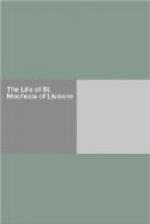Once as Mochuda, with large offerings, was returning from Kerry to Rahen he passed through the confines of Delbhna [Lemanaghan?] by the lake called Muincine [Lough Gur?] where he and his party were overtaken by night. They found here before them by the roadside revolving wheels, which an artisan, who was erecting a mill on the stream from the lake, had set up for a joke. As the wheels revolved they made a terrific noise which was heard by the whole neighbourhood. Many of the inhabitants of the neighbouring villages aroused by the noise rushed out, with appeals for help and loud cries, to investigate the matter. Mochuda’s people were frightened by the din and their pack and riding horses stampeded and lost their loads and it was not without difficulty that they were caught again. Mochuda knew what caused the noise and he told the workmen who had played this mischievous trick that they should be scattered throughout the different provinces of Ireland, that they should be always worthless and unprofitable, that the mill they were engaged on should never be finished and that their progeny after them should be valueless race of mischief-makers. The latter are called the Hi-Enna [Ui Enna Aine Aulium] to-day.
One day Mochuda came to a place called Cluain-Breanainn where apples abounded. His followers asked some apples for him but the orchard owner refused them. Said Mochuda:—“From this day forward no fruit shall grow in you orchard for ever,” and that prophecy has been fulfilled.
Mochuda had in his monastery twelve exceedingly perfect disciples, scil.:—Caoinche Mac Mellain [Mochua Mac Mellain or Cronan], who was the first monk to enter Rahen; Mucoinog [Mochoemog]; the three sons of Nascainn—Goban, Srafan, and Laisren; Mulua [Molua]; Lugair; Mochomog Eile; Aodhan [Aedhan]; Fachtna Coinceann [Fiachna or Fiochrae]; Fionnlog and Mochomog who became a bishop later. The virtue of these monks surpassed belief and Mochuda wished to mitigate their austerities before their death. He therefore built separate cells for them that they might have some comfort in their old age as a reward for their virtue in youth; moreover he predicted blessings for them. He made [a prophecy] for one of them, mentioned above, scil.:—Mochua Mac Mellain, for whom he had built a comfortable cell at a place called Cluain-Da-Chrann. He said to him: “Your place of resurrection will not be here but in another place which God has given you.” That prediction has been verified. To a second disciple, scil.:—Fiachna, Mochuda said:—“Your resurrection will not be in this place though I have made you a cell here; you will have three further abiding places, nevertheless it will be with your own companion, Aodhan, that your remains will rest and your resurrection will be in the territory of Ui Torna, and it is from you that the place will get its name.” For this Aodhan alluded to Mochuda likewise built another cell in the land of Ui Torna close by Slieve Luachra, and speaking prophetically he said to him: “The remains of your fellow-disciple, Fiachna, will be carried to you hither and from him will this place be named.” That statement has been verified, for the church is now called Cill-Fiachna and it was first called Cill-Aeghain. Concerning other persons, Mochuda prophesied various other things, all of them have come to pass.




